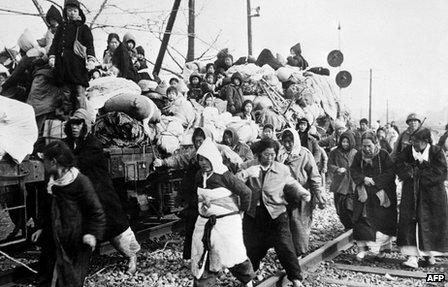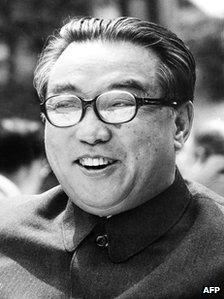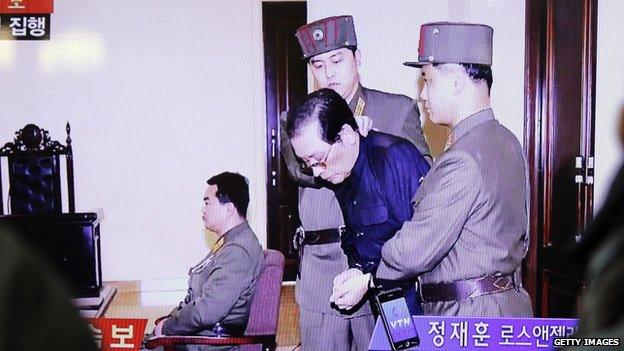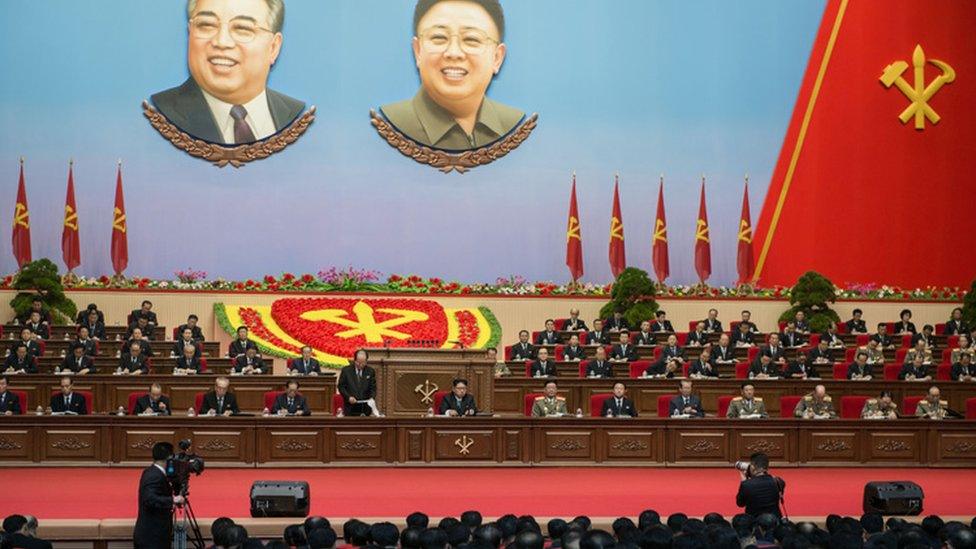North Korea profile - Timeline
- Published
A chronology of key events:
1945 - After World War II, Japanese occupation of Korea ends with Soviet troops occupying the north, and US troops the south.

The Korean War killed at least 2.5 m, pitting the Chinese-backed North against the South, supported militarily by the UN
1946 - North Korea's Communist Party, called the Korean Workers' Party, inaugurated. Soviet-backed leadership installed, including Red Army-trained Kim Il-sung.
1948 - Democratic People's Republic of Korea proclaimed, with Kim Il-sung installed as leader. Soviet troops withdraw.
1950 - South declares independence, sparking North Korean invasion and the Korean War.
1953 - Armistice ends Korean War.
1960s - Rapid industrial growth.
1968 January - North Korea captures USS Pueblo, a US naval intelligence ship.
1972 - North and South Korea issue joint statement on peaceful reunification.
1974 February - Kim Il-sung designates eldest son, Kim Jong-il as his successor.
1985 - North Korea joins the international Nuclear Non-Proliferation Treaty, barring the country from producing nuclear weapons.
1986 - Research nuclear reactor in Yongbyon becomes operational.
1991 - North and South Korea join the United Nations.
1993 - International Atomic Energy Agency accuses North Korea of violating the Nuclear Non-Proliferation Treaty and demands inspectors be given access to nuclear waste storage sites. North Korea threatens to quit Treaty.
1993 - North Korea test-fires a medium-range Rodong ballistic missile into the Sea of Japan.
1994 July - Death of Kim Il-sung. Kim Jong-il succeeds his father as leader.
1994 October - North Korea and the US sign an Agreed Framework under which Pyongyang commits to freezing its nuclear programme in return for heavy fuel oil and two light-water nuclear reactors.
Flood and famine
1996 - Severe famine follows widespread floods; 3 million North Koreans reportedly die from starvation.

Kim Il-sung (1912-1994) was named "Eternal President" in 1998
1996 April - North Korea announces it will no longer abide by the armistice that ended the Korean War, and sends thousands of troops into the demilitarised zone.
1996 September - A North Korean submarine with 26 commandos and crew on board runs aground near the South Korean town of Gangneung. All but one on board is killed along with 17 South Koreans following several skirmishes.
1998 June - South Korea captures North Korean submarine in its waters. Crew found dead inside.
1998 August - North Korea fires a multistage long-range rocket which flies over Japan and lands in the Pacific Ocean, well beyond North Korea's known capability.
Historic handshake
2000 June - Landmark inter-Korean summit takes place in Pyongyang between Kim Jong-il and South Korean President Kim Dae-jung, paving the way for the reopening of border liaison offices and family reunions. The South also grants amnesty to over 3,500 North Korean prisoners.
2002 January - US President George W Bush labels North Korea, Iraq and Iran an "axis of evil" for continuing to build "weapons of mass destruction".
2002 June - North and South Korean naval vessels wage a gun battle in the Yellow Sea. Some 30 North Korean and four South Korean sailors are killed.
2002 September - Japanese Prime Minister Junichiro Koizumi makes historic visit during which North Korea admits to having abducted 13 Japanese citizens in the 1970s and 1980s and that at least four are still alive.
Nuclear brinkmanship
2002 October - US and its key Asian allies Japan and South Korea halt oil shipments following North Korea's reported admission that it has secretly been developing a uranium-based nuclear programme.
2002 December - North Korea announces it is reactivating nuclear facilities at Yongbyon and expels UN inspectors.
2003 January - North Korea withdraws from the Nuclear Non-Proliferation Treaty, marking the beginning of a series of six-party talks involving China, the Koreas, the US, Japan and Russia to try to resolve the nuclear issue.
2003 May - North Korea withdraws from 1992 agreement with South Korea to keep the Korean Peninsula free of nuclear weapons.
Six-party talks
2003 October - Pyongyang declares it has completed the reprocessing of 8,000 spent nuclear fuel rods. Experts say this would give the North enough weapons-grade plutonium to develop up to six nuclear bombs within months.
2005 February - North Korea admits publicly for the first time that it has produced nuclear weapons for "self defence".
2006 July - North Korea test fires seven missiles including a long-range Taepodong-2 missile, which crashes shortly after take-off despite it reportedly having the capability to hit the US.
2006 October - North Korea conducts its first nuclear weapons test at an underground facility. The UN imposes economic and commercial sanctions on North Korea.
2007 July - North Korea shuts down it main Yongbyon reactor after receiving 50,000 tons of heavy fuel oil as part of an aid package.
2007 August - South Korea announces it will send nearly 50m US dollars in aid to the North after Pyongyang makes rare appeal for flood relief.
Nuclear declaration
2007 October - Second inter-Korean summit held in Pyongyang. President Roh Moo-hyun becomes the first South Korean leader to walk across the Demilitarized Zone separating North and South.
2008 March - North-South relations deteriorate sharply after new South Korean President Lee Myung-bak promises to take a harder line on North Korea.
2008 August - Kim Jong-il suffers a stroke
2008 October - North agrees to provide full access to Yongbyon nuclear site after US removes it from terrorism blacklist.
Nuclear tensions rise
2009 January - North Korea says it is scrapping all military and political deals with the South, accusing it of "hostile intent".
2009 April - North Korea launches a long-range rocket, carrying what it says is a communications satellite; its neighbours accuse it of testing long-range missile technology. Condemnation from the UN Security Council prompts North Korea to walk out of six-party talks and restart its nuclear facilities.
2009 May - North Korea carries out its second underground nuclear test. UN Security Council condemns move in June.
2009 August - North Korea frees American journalists Laura Ling and Euna Lee after former US President Bill Clinton facilitates their release. The pair was sentenced to 12 years hard labour for allegedly crossing the border illegally.
North makes conciliatory gestures to South, sending delegation to funeral of former President Kim Dae-jung, releasing four South Korean fishermen, and agreeing to resume family reunions.
2009 November - North Korea's state-run news agency reports the reprocessing of 8,000 spent fuel rods is complete, garnering enough weapons-grade plutonium for one to two nuclear bombs.
2010 February - Increased social unrest reportedly leads the government to relax free market restrictions after a 2009 currency revaluation wiped out many cash savings in the country.
Sinking of Cheonan
2010 March - North Korea sinks South Korean warship Cheonan near sea border.
2010 September - Kim Jong-il's youngest son Kim Jong-un is appointed to senior political and military posts, fuelling speculation of a possible succession.
2010 November - North Korea reportedly shows an eminent visiting American nuclear scientist a new secretly-built facility for enriching uranium at its Yongbyon complex. The revelation sparks alarm and anger in US, South and Japan.
Cross-border clash near disputed maritime border results in the deaths of two South Korean marines. North Korea's military insists it did not open fire first and blames the South for the incident.
Succession
2011 December - Death of Kim Jong-il. Kim Jong-un presides at funeral and takes over key posts by April.
2012 April - Rocket launch - viewed internationally as a banned test of long-range Taepodong-2 missile technology - fails. North Korea says aim was to put a satellite into orbit to mark 100th birth anniversary of Kim Il-sung.
2012 October - North Korea claims it has missiles than can hit the US mainland after South Korea and Washington announce a deal to extend the range of South Korea's ballistic missiles.
2012 December - North Korea successfully launches a "rocket-mounted satellite" into orbit following a failed attempt in April.
Third nuclear test
2013 February - UN approves fresh sanctions after North Korea stages its third nuclear test, said to be more powerful than the 2009 test.
2013 April - North Korea says it will restart all facilities at its main Yongbyon nuclear complex and briefly withdraws its 53,000-strong workforce from the South-Korean-funded Kaesong joint industrial park stalling operations at 123 South Korean factories.
2013 July - Panama impounds a North Korean ship carrying two MiG-21 jet fighters under bags of sugar. The UN later blacklists the ship's operator.
2013 September - Sole ally China bans export to North Korea of items that could be used to make missiles or nuclear, chemical and biological weapons.
2013 December - Kim Jong-un's uncle, Chang Song-thaek, is found guilty of attempting to overthrow the state and is summarily executed - in a purge seen as the biggest shake-up since the death of Kim Jong-il in 2011.
2014 March - North Korea test-fires two medium-range Rodong ballistic missiles for the first time since 2009, in violation of UN resolutions and just hours after the US, South Korea and Japan met in the Netherlands for talks.
Two drones allegedly from North Korea are found in the south, sparking concerns about the north's intelligence gathering capabilities.

The North Korean leader's uncle, Chang Song-thaek, appears in court before his execution
2014 October - Officials pay surprise visit to south, agree to resume formal talks that have been suspended since February.
2014 December - North Korea and US exchange accusations of cyber-attacks over a Sony Pictures film mocking Kim Jong-un, prompting new US sanctions the following month.
2015 August - South Korea halts loudspeaker propaganda broadcasts across the Demilitarised Zone after the North fires on them during annual US/South-Korean military exercises.
Nuclear push
2015 September - North Korea confirms it has put its Yongbyon nuclear plant - mothballed in 2007 - back into operation.
2015 December - US imposes new sanctions on North Korea over weapons proliferation, targeting the army's Strategic Rocket Force, banks and shipping companies.
2016 January - Government announcement of first hydrogen bomb test met with widespread expert scepticism.

North Korea's ruling party held a rare congress in May 2016
2016 May - The ruling Workers Party holds its first congress in almost 40 years, during which Kim Jong-un is elected leader of the party.
2016 November - UN Security Council further tightens sanctions by aiming to cut one of North Korea's main exports, coal, by 60 per cent.
2017 January - Kim Jong-un says North Korea is in the final stages of developing long-range guided missiles capable of carrying nuclear warheads.
2017 February - Kim Jong-un's estranged half-brother Kim Jong-nam is killed by a highly toxic nerve agent in Malaysia, with investigators suspecting North Korean involvement.
2017 July - Pyongyang test fires a long-range missile into the Sea of Japan, with some experts stating the missile could potentially reach Alaska.
2017 August - Tension rises in war of words with US over North Korean threat to fire ballistic missiles near US Pacific territory of Guam.
China announces it plans to implement the UN sanctions against North Korea agreed earlier in the month, banning imports of coal, minerals and sea food.
Summit diplomacy
2018 January - First talks in two years between North and South Koreas begin thaw that leads to the North sending a team to the Winter Olympics in the South.
2018 April - Kim Jong-un becomes first North Korean leader to enter the South when he meets South Korean President Moon Jae-in for talks at the Panmunjom border crossing. They agree to end hostile actions and work towards reducing nuclear arms on the peninsula.
2018 June - Kim Jong-un and US President Donald Trump's historic meeting in Singapore seeks to end a tense decades-old nuclear stand-off. A follow-up meeting in Hanoi in February 2019 breaks down after North Korea refuses nuclear disarmament in return for lifting economic sanctions.
2019 April - Kim Jong-un makes first visit to Russia, and receives support from President Vladimir Putin over security guarantees ahead of nuclear disarmament at a meeting in the far-eastern city of Vladivostok.